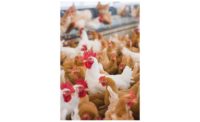Conagra Brands commits to higher standards for welfare of broiler chickens
The company collaborated with the Humane Society of the United States on the new goals.

Conagra Brands, Inc., Chicago, announced steps to implement higher standards for the treatment of broiler chickens in its supply chain sourcing practices. The company collaborated with the Humane Society of the United States (HSUS), Washington, D.C., on the new goals, which are an expansion to Conagra's existing broiler chicken policy.
"Conagra Brands is committed to the humane treatment of animals, and our belief is that creating quality food for our consumers is more than just putting ingredients together; it also includes how we source those ingredients," says Dave Biegger, chief supply chain officer, Conagra Brands. "We're proud to work with the Humane Society of the United States as well as others in the food industry to take meaningful steps toward positive change in broiler chicken welfare practices."
"The Humane Society of the United States (HSUS) applauds Conagra for addressing the most pressing concerns related to chicken meat production," says Josh Balk, vice president of farm animal protection at HSUS. "We're enthusiastic about our long relationship with Conagra, and look forward to continuing our work together throughout 2019 and beyond."
Conagra Brands will work with its suppliers, peers and other external stakeholders in an effort to help achieve the following improvements in the treatment of broiler chickens by 2024:
- Source 100% of chicken used in products from either Royal Society for the Prevention of Cruelty to Animals (RSPCA) or Global Animal Partnership (GAP)-approved breeds or strains.
- Offer improved environments that meet GAP standards for better lighting, litter quality and other enrichments.
- Provide birds with more space to perform natural behaviors, including a stocking density of no greater than 6 pounds per square foot and no use of broiler cages.
- Employ a multi-step controlled atmosphere processing system and avoid live-shackling or live-dumping.
- Track supplier compliance via third-party auditing.
"We recognize that our 2024 goals require industry-wide partnership to succeed, and we will collaborate across our value chain to further animal welfare while preserving consumer access to quality, affordable food," adds Biegger.
Looking for a reprint of this article?
From high-res PDFs to custom plaques, order your copy today!




